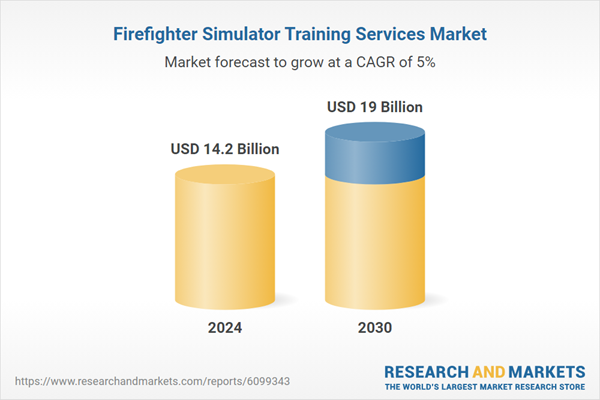Global Firefighter Simulator Training Services Market - Key Trends & Drivers Summarized
Why Is Simulator-Based Training Becoming Essential for Modern Firefighting?
Firefighter simulator training services are rapidly transforming how emergency personnel are prepared for real-world fire scenarios, offering an immersive, risk-free environment to develop critical skills, decision-making, and situational awareness. As fire incidents become more complex due to urbanization, climate change, hazardous materials, and evolving building designs, traditional classroom training and live burns are no longer sufficient on their own. Simulator-based training addresses this gap by replicating a wide range of fire conditions - including structural fires, wildfires, vehicle extrications, chemical spills, and confined space rescues - with high levels of realism and repeatability. These systems leverage 3D modeling, augmented reality (AR), and virtual reality (VR) technologies to create lifelike training experiences where firefighters can practice response protocols, communications, and coordination under pressure. Moreover, simulator training reduces reliance on resource-heavy live drills, conserving water, fuel, and training grounds, while eliminating the environmental risks and injuries associated with live fire exercises. Global fire departments, military units, airports, and industrial safety teams are increasingly adopting simulator-based training to standardize instruction, test new recruits, and maintain operational readiness among experienced personnel. This shift reflects a broader movement in emergency services toward digitization, performance analytics, and continuous learning, making firefighter simulator training not just an educational tool but a cornerstone of modern firefighting infrastructure.How Are Technological Innovations Enhancing Simulator Training Capabilities?
The firefighter simulator training services market is witnessing rapid evolution due to technological advancements that enhance realism, adaptability, and learning outcomes. Modern simulators incorporate advanced VR/AR environments, haptic feedback, spatial audio, and dynamic fire behavior modeling to immerse trainees in fully interactive fire scenarios. AI-driven scenario generation allows trainers to simulate unpredictable events - such as sudden backdrafts, flashovers, or equipment malfunctions - mimicking the real-time complexity of active fires. Cloud-based platforms are enabling remote training and centralized performance tracking, which is especially beneficial for regional or rural departments with limited access to physical training facilities. Motion-capture systems and wearable sensors are integrated into training suits, capturing metrics like reaction time, movement patterns, and vitals to assess physical readiness and procedural compliance. Advanced simulators also allow multi-user collaboration, enabling teams to train together in joint response operations, simulating communication breakdowns, command-and-control structures, and cross-agency coordination. Furthermore, high-fidelity replica equipment and vehicle simulators allow firefighters to practice operating pumps, aerial ladders, and breathing apparatuses under simulated duress. Real-time instructor control and after-action review tools allow facilitators to pause, adjust, or replay scenarios to debrief trainees and reinforce critical lessons. These innovations are significantly increasing the effectiveness and accessibility of firefighter training, aligning it with modern pedagogical models and mission-critical performance standards.What Role Do Safety Standards, Budget Constraints, and Institutional Partnerships Play in Market Growth?
The adoption of firefighter simulator training services is strongly influenced by regulatory mandates, institutional budgets, and the evolving risk landscape in urban and industrial environments. National fire safety agencies, defense departments, and international emergency management bodies are increasingly incorporating simulation-based modules into their certification frameworks and training curricula. Compliance with standards set by organizations such as NFPA (National Fire Protection Association), ISO, and local fire authorities often requires recurring training cycles, which simulators support efficiently through repeatable, customizable scenarios. However, budget constraints, particularly in smaller municipalities or developing countries, pose challenges to acquiring and maintaining high-end simulation infrastructure. This has led to a rise in public-private partnerships, grants, and shared training facilities that make simulator services more accessible. Educational institutions and vocational training centers are also partnering with simulator vendors to offer specialized courses and certifications, expanding workforce readiness beyond active-duty firefighters. Industrial sectors - such as petrochemicals, aviation, and maritime - are integrating fire simulation into their safety programs to train in-house emergency response teams under industry-specific conditions. As ESG (Environmental, Social, Governance) considerations grow in importance, simulator training offers a sustainable alternative to live fire drills, reducing emissions, water use, and hazardous waste. These overlapping institutional, regulatory, and economic factors are shaping a supportive ecosystem for simulator-based firefighter training services across global markets.What's Driving the Rapid Expansion of the Firefighter Simulator Training Services Market Globally?
The growth in the global firefighter simulator training services market is driven by several converging factors rooted in public safety demands, technological maturity, climate-related risks, and evolving training methodologies. A significant driver is the rising incidence of high-impact fire events - ranging from urban structure fires and wildfires to industrial and airport emergencies - necessitating better-prepared first responders. The complexity of modern emergencies demands simulation-based learning where firefighters can rehearse multi-scenario responses without endangering lives or resources. Technological readiness and falling hardware costs are making simulator deployments more affordable and scalable, even for mid-sized municipalities and training academies. Additionally, the expansion of smart cities and high-density urban construction creates fire risks that require highly specialized training, further boosting demand. The integration of simulator training into military firefighting, aviation rescue operations, and oil & gas facility safety programs is also expanding the market across sectors. Post-COVID shifts toward virtual learning and remote training are catalyzing the use of cloud-based simulation platforms that support decentralized and hybrid training models. Moreover, increased government investment in disaster preparedness, homeland security, and first responder training is creating favorable policy environments and funding pipelines. As workforce turnover and retirements challenge fire departments globally, simulator services offer an effective, scalable solution for onboarding, skill assessment, and ongoing performance optimization. These factors - spanning safety culture, digital infrastructure, sectoral crossover, and climate resilience - are collectively fueling the accelerated growth of firefighter simulator training services around the world.Report Scope
The report analyzes the Firefighter Simulator Training Services market, presented in terms of market value (US$). The analysis covers the key segments and geographic regions outlined below:- Segments: Type (Location-based Training, In-house Training); Simulator Type (Fire Driving Simulator, Fire Truck Crew Simulator, Custom Fire Truck Cab Simulator, Fire Pump Operator Simulator).
- Geographic Regions/Countries: World; United States; Canada; Japan; China; Europe (France; Germany; Italy; United Kingdom; and Rest of Europe); Asia-Pacific; Rest of World.
Key Insights:
- Market Growth: Understand the significant growth trajectory of the Location-based Training segment, which is expected to reach US$12.6 Billion by 2030 with a CAGR of a 4.2%. The In-house Training segment is also set to grow at 6.7% CAGR over the analysis period.
- Regional Analysis: Gain insights into the U.S. market, valued at $3.7 Billion in 2024, and China, forecasted to grow at an impressive 4.8% CAGR to reach $3.1 Billion by 2030. Discover growth trends in other key regions, including Japan, Canada, Germany, and the Asia-Pacific.
Why You Should Buy This Report:
- Detailed Market Analysis: Access a thorough analysis of the Global Firefighter Simulator Training Services Market, covering all major geographic regions and market segments.
- Competitive Insights: Get an overview of the competitive landscape, including the market presence of major players across different geographies.
- Future Trends and Drivers: Understand the key trends and drivers shaping the future of the Global Firefighter Simulator Training Services Market.
- Actionable Insights: Benefit from actionable insights that can help you identify new revenue opportunities and make strategic business decisions.
Key Questions Answered:
- How is the Global Firefighter Simulator Training Services Market expected to evolve by 2030?
- What are the main drivers and restraints affecting the market?
- Which market segments will grow the most over the forecast period?
- How will market shares for different regions and segments change by 2030?
- Who are the leading players in the market, and what are their prospects?
Report Features:
- Comprehensive Market Data: Independent analysis of annual sales and market forecasts in US$ Million from 2024 to 2030.
- In-Depth Regional Analysis: Detailed insights into key markets, including the U.S., China, Japan, Canada, Europe, Asia-Pacific, Latin America, Middle East, and Africa.
- Company Profiles: Coverage of players such as AC Fire Pump (Xylem Inc.), Armstrong Fluid Technology, Clarke Fire Protection Products, Darley, Ebara Corporation and more.
- Complimentary Updates: Receive free report updates for one year to keep you informed of the latest market developments.
Some of the 37 companies featured in this Firefighter Simulator Training Services market report include:
- Alpine Metal Tech
- Canadian Emergency and Risk Management (CERM)
- Delaware State Fire School
- Environmental Tectonics Corporation (ADMS)
- FAAC Incorporated
- Falck Denmark A/S
- Fire Service College Limited
- FLAIM Systems
- Flame-Sim LLC
- International Fire Training Centre
- KFT Fire Trainer
- Lakeland College
- Lambton College
- LION Protects
- Louisiana State University
- NorQuest College
- Nova Scotia Firefighters School
- Oklahoma State University
- Parkland College
- PetroSafe Technologies, Inc.
This edition integrates the latest global trade and economic shifts into comprehensive market analysis. Key updates include:
- Tariff and Trade Impact: Insights into global tariff negotiations across 180+ countries, with analysis of supply chain turbulence, sourcing disruptions, and geographic realignment. Special focus on 2025 as a pivotal year for trade tensions, including updated perspectives on the Trump-era tariffs.
- Adjusted Forecasts and Analytics: Revised global and regional market forecasts through 2030, incorporating tariff effects, economic uncertainty, and structural changes in globalization. Includes historical analysis from 2015 to 2023.
- Strategic Market Dynamics: Evaluation of revised market prospects, regional outlooks, and key economic indicators such as population and urbanization trends.
- Innovation & Technology Trends: Latest developments in product and process innovation, emerging technologies, and key industry drivers shaping the competitive landscape.
- Competitive Intelligence: Updated global market share estimates for 2025, competitive positioning of major players (Strong/Active/Niche/Trivial), and refined focus on leading global brands and core players.
- Expert Insight & Commentary: Strategic analysis from economists, trade experts, and domain specialists to contextualize market shifts and identify emerging opportunities.
Table of Contents
Companies Mentioned (Partial List)
A selection of companies mentioned in this report includes, but is not limited to:
- Alpine Metal Tech
- Canadian Emergency and Risk Management (CERM)
- Delaware State Fire School
- Environmental Tectonics Corporation (ADMS)
- FAAC Incorporated
- Falck Denmark A/S
- Fire Service College Limited
- FLAIM Systems
- Flame-Sim LLC
- International Fire Training Centre
- KFT Fire Trainer
- Lakeland College
- Lambton College
- LION Protects
- Louisiana State University
- NorQuest College
- Nova Scotia Firefighters School
- Oklahoma State University
- Parkland College
- PetroSafe Technologies, Inc.
Table Information
| Report Attribute | Details |
|---|---|
| No. of Pages | 172 |
| Published | February 2026 |
| Forecast Period | 2024 - 2030 |
| Estimated Market Value ( USD | $ 14.2 Billion |
| Forecasted Market Value ( USD | $ 19 Billion |
| Compound Annual Growth Rate | 5.0% |
| Regions Covered | Global |









